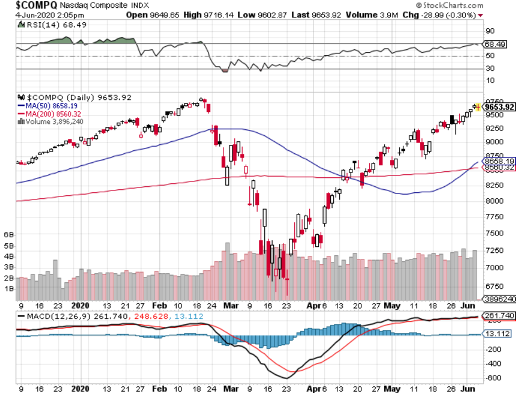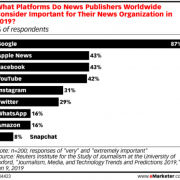Europe's Big Tech Tax Grab
Big Tech regulation gets the protection of the U.S. government.
The U.S. government has announced that it is looking into aggressive regulation originating from foreign countries that would die to have a FANG themselves.
This is just another salient data point to which tech will lead us through the maze of complexity that the world now finds itself in.
Many jumped on the bandwagon saying it was a matter of time before regulation destroys big tech, but I will argue that big tech has become too big to fail and the value generated from stock appreciation and tax revenue has become even more important.
Tech has been the only industry to not get pummeled by the coronavirus and the ramifications of social unrest.
The U.S. government doesn’t want to tip over the last remaining pillar the U.S. economy is clinging to, they are desperate to allow the U.S. tech models to stay intact.
The Federal and State budgets have massive holes in them and crushing tech’s contribution to the revenue coffers would be political suicide.
Understanding how the administration cherishes big tech means viewing them through the prism of how other countries treat U.S. tech companies hoping to take a piece of the pie themselves through clever “regulation.”
The European Union, the Czech Republic, and the U.K. plan to siphon off tax revenue from big tech even though confronted by possible trade sanctions from the U.S.
The U.S. probe also will look into the digital services tax plans of Austria, Brazil, Indonesia, Italy, Spain, and Turkey because they are all looking to skim some cash off of big tech’s cash cow.
To read more about the tax fiasco, please click here.
Europe and the emerging economies have been hit harder than the U.S., not in terms of deaths, but in relative economic terms because they don’t possess the rolodex of Fortune 500 companies that can just issue more corporate debt or a Fed central bank that is delivering trillions in liquidity that has saved the stock market.
Washington has specifically been eying up France for a section 301 investigation after it became the first country to fully implement a digital sales tax in July 2019.
France has been quite aggressive in calling out big tech for undermining and exploiting their economy by not paying tax due.
French Finance Minister Bruno Le Maire has been sharp-tongued criticizing America’s big tech companies for running wild in European markets.
A 3% digital sales tax was in the cards before the U.S. slapped on a counter tariff to French goods which delayed the frosty confrontation.
Europe’s vast network of splintered resources and unbalanced innovation combined with Europe’s infamous avalanche of bureaucracy meant that developing a famous tech company fell through the cracks.
Nothing even remotely close to Silicon Valley was ever conjured up inside the confines of the European Union.
The consequences have been costly with most Europeans relying on Apple cell phones, Google software, Netflix subscriptions, and Microsoft enterprise products to get them through the day just like most Americans.
The tax grab is out of desperation as the EU confronts a post-coronavirus world where they are increasingly controlled by decisions from the Communist Chinese and subject to a graying population that delivers a reduced tax revenue base.
The European Union is one of the biggest losers from the coronavirus.
The hands-off warning by the U.S. government on its own big tech companies puts a premium on their existence to the U.S. economy.
Instead of twisting their arm to squeeze every extra tax dollar out of them, they will most likely get more access to deliver the services most Americans are hooked on.
It’s not a secret that current U.S. President Donald Trump is hellbent on destroying big tech but there is no way to do it without destroying the U.S. economy and the U.S. stock market.
At this point, just a handful of tech companies comprises over 22% of the S&P and this will most likely continue as other industries are still licking their wounds with some analysts believing it will take 10 years to get back to late 2019 economic levels.
The most likely scenario for big tech is that the array of crises has delayed real regulation indefinitely and the U.S. will protect big tech from a tax grab abroad.
The best-case scenario is zero regulation leading to zero extra costs.
Either way, stock appreciation is in the cards for tech’s future.
The end result is that big tech could eventually comprise up to 30% of the S&P in the next 3 years which dovetails nicely with a recent analyst call that Microsoft will hit over $2 trillion in market capitalization in the next 2 years.




